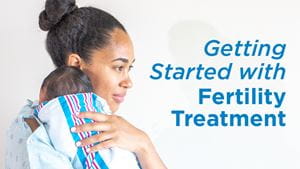
Planning for a family and trying to get pregnant can be an exciting time, but if you are ready to have a baby and are having trouble getting pregnant, you may want to talk to your OBGYN about seeing a fertility specialist.
We asked Rochester Regional Health reproductive endocrinologist and fertility specialist, Dr. Jamil Mroueh about fertility doctors, how to prepare for your first appointment, what to expect during fertility treatment and more.
Generally, it takes families about 5 to 6 months to conceive. If you are under the age of 35 and have been having unprotected sex for more than a year, you should see a fertility specialist.
Other families who may want to see a fertility specialist sooner are:
A fertility specialist is a doctor who has studied and is board certified in obstetrics and gynecology, and then spent an extra 3-4 years focusing on infertility and reproductive endocrinology-related issues.
“This additional training means that we not only have the technical and surgical skill to treat some of the more complex causes of infertility,” said Dr. Mroueh. “But it also gives us the knowledge and understanding to determine the cause and best path forward, working with you and your family.
“Typically, patients come to us through their OBGYN although many call us directly for help in getting pregnant,” said Dr. Mroueh. “When you call to make your first appointment, we’ll ask you a bit about your background and to gather some information for us to help kickstart our evaluation.”
Some of the most helpful things for families to have ready for that first appointment include your:
If you have a partner, it’s important to have their background and have them present and involved, especially at your first fertility specialist appointment.
“During your first appointment, we’ll review your medical, menstrual, fertility and genetic history,” said Dr. Mroueh. “We’ll talk about what you’ve tried, provide some insights and help to relieve some common misconceptions. Your difficulty getting pregnant is not your fault.”
If we need more information, we’ll send you for three quick tests:
We help to schedule these tests, review the results and then work with you on the best path forward. We’ll discuss the types of treatments available, including IVF, the costs and what to expect over the coming weeks and months.